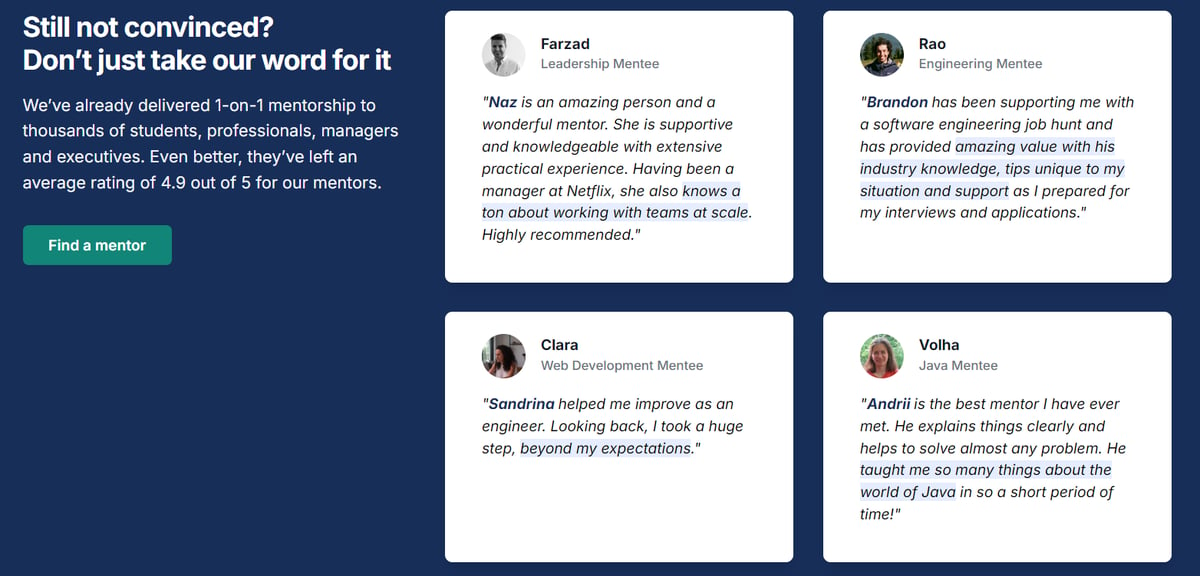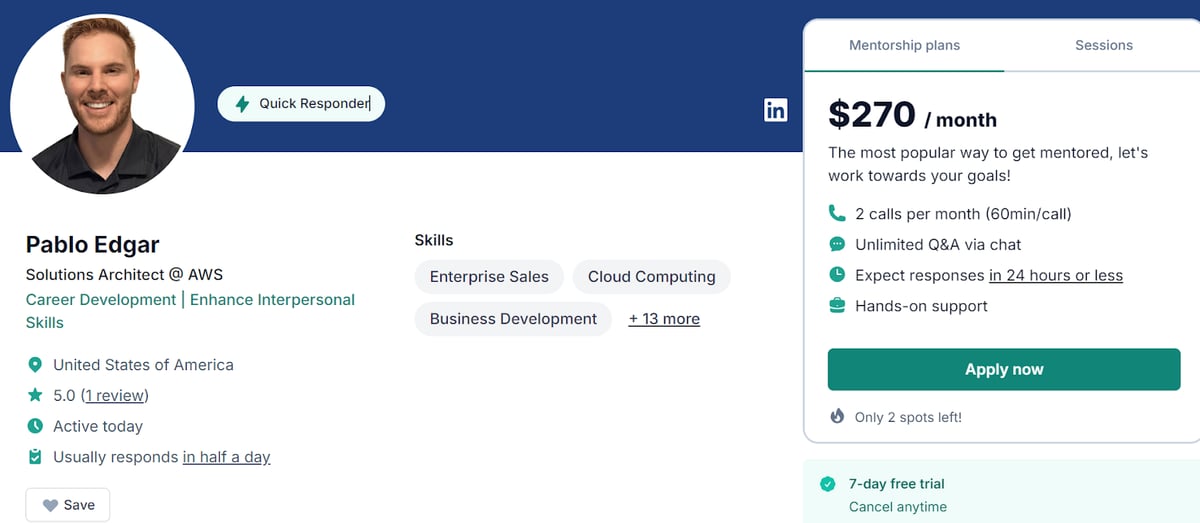Helpful summary
- Why You Can Trust Us: MentorCruise has successfully helped numerous executives enhance their communication skills through personalized one-on-one mentorship, resulting in improved leadership effectiveness and team dynamics.
- Why It Matters: Effective executive communication leads to better decision-making, increased team morale, and overall organizational success, impacting alignment, trust, employee engagement, stakeholder relations, and crisis management.
- Action Points: The article suggests cultivating personal branding, interpersonal communication, storytelling, transparency, adaptability, negotiation, empathy, feedback, asking open-ended questions, and active listening to be a leader your team looks up to.
- Further Research: To complement your learning, consider exploring more detailed case studies, enrolling in communication workshops, or seeking one-on-one mentorship for personalized guidance.
Need help with executive communication skills?
The business landscape today is moving at an unprecedented pace, which is why effective communication is essential for leadership success. For executives mandated to guide teams through complex situations, the ability to communicate well with confidence, empathy, and clarity isn’t just a desirable trait. It is an indispensable skill.
In this comprehensive MentorCruise guide, we explore the most essential communication skills that will distinguish exceptional executives from the rest. Be the leader your team looks up to.
Why listen to us?
We have helped numerous executives refine their communication skills through personalized mentorship. Our tailored approach ensures that executives gain practical, real-world skills applicable to their professional scenarios.

By addressing pain points like public speaking and active listening, our clients have seen significant improvements in leadership effectiveness and team dynamics. Enhanced communication skills lead to better decision-making, increased team morale, and overall organizational success.
What is executive communication?
Executive communication is the process of relaying information, ideas, and instructions from top-level executives and leadership to various teams and stakeholders in an organization.
Aside from internal and external communication, this also involves interacting with employees, clients, partners, and the general public.
Why is executive communication important?
Good executive communication is a cornerstone of leadership efficiency in an organization, significantly impacting several aspects of its operation. Some of its benefits are:
- Alignment and Vision: Clear and consistent communication guarantees that every employee is aligned with your organization’s vision, mission, and goals. It provides a sense of purpose and direction.
- Trust and credibility: Executives who openly communicate with integrity build trust and credibility among employees and stakeholders, thus fostering collaboration, loyalty, and a favorable organizational culture.
- Employee Engagement: Executive communication also promotes inclusivity in the workplace, motivating employees to keep contributing ideas and offering feedback.
- Stakeholder Relations: Executives are the face of the organization. By effectively communicating with stakeholders, they can improve relationships, foster partnerships, and strengthen the company’s reputation.
- Crisis Management: It is during times of crisis when effective executive communication is more critical.
12 executive communication skills to cultivate as a leader
Keep a checklist of these 12 executive communication skills you need as a leader of your team.
1. Relentless interpersonal communication
Strong interpersonal communication skills are a must-have for every executive as they help them build and nurture relationships with their teammates and clients. It doesn’t just help resolve conflicts easily and ensure harmony in the workplace, but also allows them to motivate their team and enhance productivity.
Should you want to hone this skill, our platform can help. MentorCruise has several mentors specializing in guiding you to enhance interpersonal skills. One of them is Pablo Edgar, a Solutions Architect in Amazon Web Services. His experiences in technical sales conversations with customers, and regularly interacting with C-Suite executives and corporate decision makers make him the ideal choice of a mentor for this aspect.

2. Strong and consistent personal branding
Among the key roles of an effective leader is to set an example and influence others. Personal branding as a form of executive communication is one of the ways to make these happen. With this, you’ll inspire others to follow in your footsteps.
Elon Musk, the CEO of SpaceX and Tesla, is a prime example of how personal branding can influence and inspire others. Musk has crafted a distinct personal brand characterized by innovation, boldness, and a vision for the future of humanity.
3. Computer Skills, Proficiency, and Know-How
In this day and age, when a business won’t be able to move forward without technology, an executive who isn’t knowledgeable about using the computer can be kicked out of the company in no time. Even little kids already are skilled in using computers, aren’t they?
Computer skills are essential for execs, especially when they need to do data analysis and digital presentations. Proficiency in many software tools enhances strategic decision-making, information dissemination, and collaboration.
Our platform is where you can head over to when you need to hone these skills. One of our mentors is Naz Delam, software engineering manager at LinkedIn. She has helped several mentees such as Gavril who cited how Delam has helped them enhance their confidence in programming and software architecture.

4. Transparency and integrity
Transparency promotes a culture of honesty, trust, and open communication both within and outside your organization. It also acts as a catalyst in the problem-solving process since it encourages collaborative talks, leading to better decision-making.
Patagonia, an outdoor clothing and gear company, is renowned for its commitment to environmental sustainability and transparency. Under the leadership of its founder, Yvon Chouinard, the company has consistently demonstrated a transparent approach to communicating its environmental impact, sustainability efforts, and business practices.
5. Unparalleled adaptability
Today’s workplace environment has become extremely dynamic. Changes can stress out employees and ignite conflicts in the workplace. By learning this skill, you can navigate these changes smoothly with stakeholders, such as your customers, suppliers, and regulatory authorities.
Satya Nadella, the CEO of Microsoft, exemplifies adaptability in executive communication through his transformative leadership style. Instead of clinging to traditional hierarchies and rigid structures, Nadella embraced a more inclusive and collaborative leadership style, fostering a culture of openness, agility, and innovation.
6. The ability to negotiate
Another skill that can help resolve workplace conflicts is negotiation. With this, you can also make collaborative choices and efficiently manage your stakeholders. It involves analyzing the conflicts, actively listening to others, finding solutions, and making effective decisions.
Struggling to master this skill on your own? Get mentored by industry-leading negotiation experts on our platform to mentor you towards acquiring this skill. We have mentors who are founders of businesses, serial entrepreneurs, and authors.

7. Showing empathy
This skill helps team members and clients feel valued and supported, thus promoting positive relationships and work culture. Empathy also helps lessen burnout, as well as increase job satisfaction and commitment.
Tim Cook, the CEO of Apple Inc., demonstrated empathy in executive communication during the COVID-19 pandemic by prioritizing the well-being of Apple's employees and customers. In 2020, he empathized with the needs of his workers by allowing them to work from home amid the coronavirus outbreak.
8. Speaking infront of the crowd
If you want to become an effective executive, you’ve got to be confident. Sure, your office skills may be great, but there are times when you need to show yourself in public engagements.
The ability to speak in front of a crowd and motivate them is crucial for execs, giving way to clear and persuasive presentations to stakeholders, inspiring teams, fostering trust, and championing the company’s visions and goals.
Tesla CEO Elon Musk is often seen speaking in front of a crowd, such as when the company unveiled the Tesla Cybertruck in 2019. Musk's confident and engaging presentation style effectively conveyed the innovative vision behind the product, capturing widespread media attention and generating significant interest and pre-orders. Note that this event was also live-streamed worldwide.
9. Effective non-verbal communication
The saying “actions speak louder than words” holds very true in this skill. Non-verbal communication is just as vital as verbal communication in executive settings. This encompasses facial expressions, gestures, posture, and tone. Mastering this will take your credibility, rapport, and clarity to the next level – crucial in effective leadership and decision-making.
Steve Jobs, Apple’s co-founder and former CEO, is the epitome of this skill. In product presentations, he was known for his deliberate use of facial expressions, gestures, and other body language to convey enthusiasm, confidence, and conviction in the company's innovations.
10. Implementing the right feedback
This executive communication skill helps boost productivity by encouraging your team to perform better. Using the right channels and with the right attitude, feedback can help leaders cultivate positive relationships.
Jeff Bezos, the founder and former CEO of Amazon, implemented a unique feedback mechanism known as the "Two-Pizza Rule" to promote effective communication and collaboration within teams. This approach encourages team members to communicate openly, share ideas, and hold each other accountable for performance and results.
11. Lending your ears to others
Effective executive communication isn’t just about talking and sharing insights. It is also about listening. Employees who feel they are not being heard have more chances to leave the company and switch jobs.
Our platform has a catalog of leadership mentors who can help you hone your listening skills so you can become the leader your team members admire. When they know they have someone ready to listen to them, they will perform their jobs better.

12. Conflict resolution and crisis management
As the executive of your team, you are its captain, so when storms hit your ship, you must be on the steering wheel. Conflict resolution and crisis management are also vital for executives. These skills enable them to address disputes and navigate crises effectively. They maintain organizational stability, foster teamwork, and ensure swift, strategic responses.
In 1982, Johnson & Johnson faced a debilitating Tylenol tampering crisis. When cyanide-laced Tylenol capsules led to multiple deaths, CEO James Burke promptly addressed the crisis by recalling 31 million bottles, cooperating with authorities, and introducing tamper-proof packaging.
Elevate your executive communication skills with MentorCruise
Nowadays, industries are in a skills-first economy, which means that professionals, especially executives, must stay on top of ever-changing leadership trends. By cultivating the right executive communication skills, you can navigate the complex challenges of the modern business landscape.
Hone these skills by listening to a mentor. On our platform, you'll have access to a diverse network of mentors with expertise in executive communication, leadership development, and organizational strategy.
With MentorCruise, you can:
- Gain Insightful Feedback: Receive personalized feedback and constructive criticism on your communication style from seasoned professionals who have been there and done that.
- Develop Your Skills: Work one-on-one with a mentor to develop practical strategies and techniques for improving your executive communication skills in real-world scenarios.
- Build Confidence: Gain the confidence and assurance you need to communicate effectively in high-stakes situations, inspire your team, and drive organizational success.
You can find mentors who can guide you to improving vital executive communication skills, such as creating your personal brand, interpersonal communication, and negotiation.







